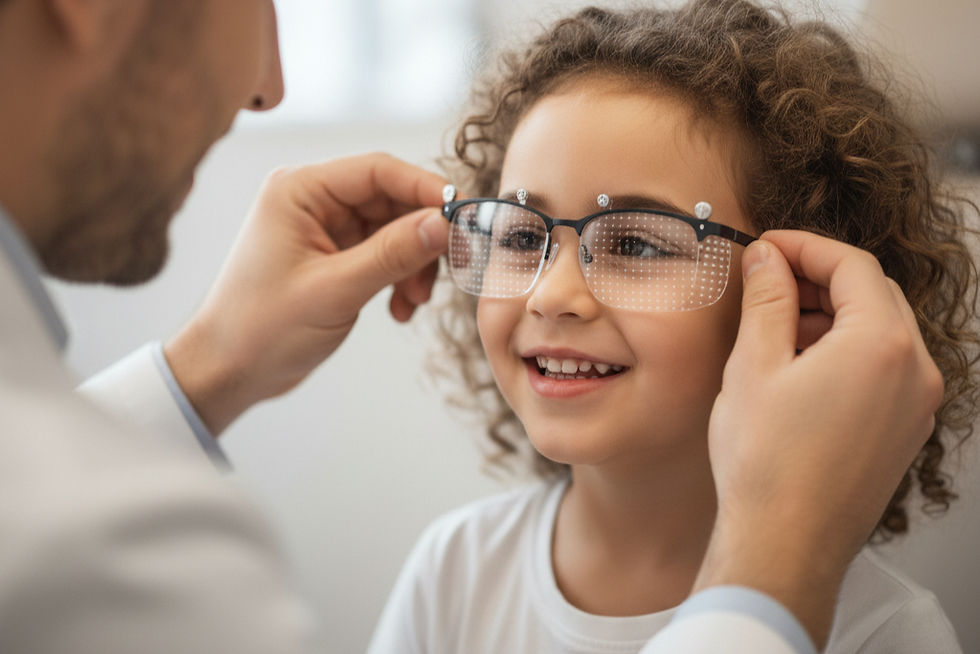Low-Dose Atropine Eye Drops for Myopia Control in Kids
- The Straits Eye Centre
- Sep 17, 2025
- 3 min read
Updated: Sep 19, 2025

Why Low-Dose Atropine Is Becoming a Trusted Option
Singapore has one of the highest rates of childhood myopia worldwide. While spectacles and lifestyle adjustments are important, they may not be enough to slow progression. Low-dose atropine eye drops are now widely recognised as a safe, effective, and non-invasive option to help manage myopia in children.
Unlike standard eye drops used for dilation, low-dose atropine (typically 0.01–0.05%) is specially formulated for long-term use in children. It does not cure myopia but slows down progression, reducing the risk of high myopia and future vision-threatening conditions.
How Do Low-Dose Atropine Drops Work?
The exact mechanism is not fully understood, but research shows that atropine reduces the signals that cause the eye to elongate. Since eyeball elongation is the main cause of myopia worsening, slowing this process with Low-Dose Atropine Eye Drops for Myopia Control in Kids helps stabilise their prescription over time.
Key points:
Used once daily, usually at bedtime.
Prescribed and monitored by an eye specialist.
Works best when started early and continued consistently.
Benefits of Low-Dose Atropine Eye Drops for Myopia Control in Kids
Clinically proven: large studies in Singapore and internationally show slowed myopia progression by 50–60%.
Safe for long-term use: low concentrations minimise side effects.
Easy to use: just one drop in each eye at night.
Part of a complete myopia management plan: can be combined with outdoor activity, customised spectacles, or Ortho-K lenses.
Safety and Side Effects
At low concentrations, side effects are uncommon. Potential issues include:
Mild light sensitivity (usually managed with photochromic lenses).
Temporary near blur at higher doses (rare at low concentrations).
Your child’s eye specialist will start with the lowest effective dose and monitor regularly to balance effectiveness with comfort.
What to Expect as a Parent
Initial consultation: assessment of myopia progression and suitability.
Prescription: usually compounded at approved pharmacies in Singapore.
Daily use: drops are instilled at bedtime for convenience.
Follow-up reviews: every 6–12 months to track effectiveness and adjust the plan.
Frequently Asked Questions
1. At what age can children start atropine drops?
Atropine may be recommended as early as 5–6 years old for children with fast-progressing myopia
2. How effective are these drops?
Studies in Singapore show a 50–60% reduction in myopia progression in children using low-dose atropine compared to no treatment.
3. Are the drops safe for long-term use?
Yes. Research shows low-dose atropine is well-tolerated for years, with minimal side effects.
4. Do the drops cure myopia?
No. They slow progression but do not reverse existing myopia. Glasses or contact lenses are still needed for clear vision.
5. How long does my child need to use atropine?
Most children use atropine for several years, usually until their prescription stabilises in the mid-teen years.
6. What happens if we stop using the drops?
Stopping treatment may lead to a rebound effect where myopia progression resumes. Specialists typically recommend gradual tapering.
7. Can atropine be combined with other treatments?
Yes. It is often paired with outdoor time, customised spectacles, or Ortho-K lenses for stronger results.
8. Is low-dose atropine covered by Medisave or insurance?
No. It is generally not claimable under Medisave. Some private insurance policies may provide limited coverage.
Meet Our Specialist
At The Straits Eye Centre, your vision care is in the hands of a dedicated team of experienced ophthalmologists. Each of our doctors brings unique expertise and a shared commitment to delivering thorough, patient-focused care for all ages. Whether you need advanced cataract surgery, paediatric eye management, or treatment for complex eye conditions, our team works together to provide the same attentive care we would want for our own families.

Dr Audrey Pang
Consultant Eye Surgeon
Special interest: Paediatric Ophthalmology, Myopia Control, Amblyopia, Strabismus Trained at the University of Cambridge and fellowship-trained in the UK, Dr Audrey Pang specialises in children’s eye care and adult strabismus. She has held roles at Tan Tock Seng Hospital and serves as Visiting Consultant at TTSH and NUH, offering gentle, evidence-based care for patients of all ages.
Cost, Medisave, and Insurance
Many procedures at The Straits Eye Centre are eligible for Medisave claims under MOH guidelines, and certain insurance plans may cover part or all of your treatment costs. Our patient care team will guide you through eligibility, claim limits, and paperwork, so you can focus on your recovery. For more details, refer to our Medisave & Insurance Guide.
Secure Your Appointment at The Straits Eye Centre
at Parkway East Hospital
Your vision health deserves timely and professional attention. Book your appointment now at our Parkway East Hospital clinic and take the first step towards clearer, healthier sight.




